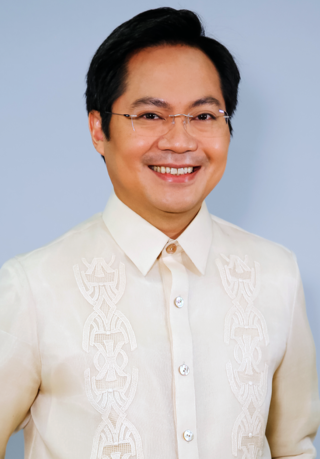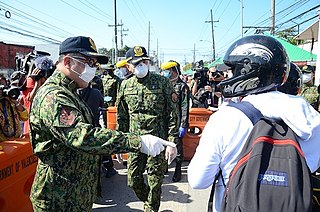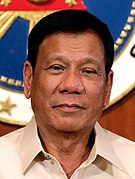
Rodrigo Roa Duterte, also known as Digong, Rody, and by the initials DU30 and PRRD, is a Filipino lawyer and politician who served as the 16th president of the Philippines from 2016 to 2022. He is the chairperson of Partido Demokratiko Pilipino, the ruling political party in the Philippines during his presidency. Duterte is the first president of the Philippines to be from Mindanao, and is the oldest person to assume office, beginning his term at age 71.
The Davao Death Squad (DDS) is a death squad group in Davao City, Philippines. The group is alleged to have conducted summary executions of street children and individuals suspected of petty crimes and drug dealing. It has been estimated that the group is responsible for the killing or disappearance of between 1,020 and 1,040 people between 1998 and 2008. A 2009 report by the Philippine Commission on Human Rights (CHR) noted stonewalling by local police under the mayorship of Rodrigo Duterte while a leaked cable observed a lack of public outrage among Davao residents.

Martial law in the Philippines refers to the various historical instances in which the Philippine head of state placed all or part of the country under military control—most prominently during the administration of Ferdinand Marcos, but also during the Philippines' colonial period, during the second world war, and more recently on the island of Mindanao during the administrations of Gloria Macapagal Arroyo and Rodrigo Duterte. The alternative term "martial law era" as applied to the Philippines is typically used to describe the Marcos martial law period specifically.

Paolo "Pulong" Zimmerman Duterte is a Filipino businessman and politician serving as the representative of Davao City's 1st district since 2019; he was a House Deputy Speaker during the 18th Congress. He previously served as vice mayor of Davao City from 2013 until his resignation in December 2017.
The following are the events in related to Philippine law in 2016. This includes developments in criminal investigations of national notability.

Rodrigo Duterte's six-year tenure as the 16th President of the Philippines began on June 30, 2016, succeeding Benigno Aquino III. He was the first president from Mindanao, the first president to have worked in all three branches of government, and the oldest to be elected. He won the election amid growing frustration with post-EDSA governance that favored elites over ordinary Filipinos. His tenure ended on June 30, 2022.

Ronald Marapon dela Rosa, known by his nickname Bato, is a Filipino politician and retired police officer who is currently serving as a Senator since 2019. He served under the Duterte administration as the chief of the Philippine National Police (PNP) from July 1, 2016 to April 19, 2018, overseeing the government's anti-drug campaign. He also served as Director General of the Bureau of Corrections from April 30 to October 12, 2018.

Delfin Negrillo Lorenzana, OLH, KGOR is a retired Philippine Army general who served as Chairman of the Bases Conversion and Development Authority from 2022 until September 2024. He previously served as Secretary of National Defense in the Cabinet of President Rodrigo Duterte from 2016 to 2022. He served in the Philippine Army from 1973 to 2004.

The War on Drugs is the intensified anti-drug campaign that began during the administration of President Rodrigo Duterte, who served office from June 30, 2016, to June 30, 2022. The campaign reduced drug proliferation in the country, but has been marred by extrajudicial killings allegedly perpetrated by the police and unknown assailants. By 2022, the number of drug suspects killed since 2016 was officially tallied by the government as 6,252; human rights organizations and academics, however, estimate that 12,000 to 30,000 civilians have been killed in "anti-drug operations" carried out by the Philippine National Police and vigilantes.
Philippine President Rodrigo Duterte made a speech at the Naval Station Felix Apolinario in Camp Panacan, Davao City on August 7, 2016. In the speech, delivered shortly after midnight during his wake visit to four NavForEastMin soldiers killed during clashes with the New People's Army in Compostela Valley, Duterte revealed the names of 150 public officials, including mayors and other local government executives, legislators, police, military and judges, found to be involved in illegal drug trade. He described the drugs situation in the country as "pandemic" after 600,000 drug dealers and dependents have surrendered to the police in just one month since he took office.

A bombing at the Roxas Night Market occurred in Davao City, Philippines, on September 2, 2016, causing at least 14 deaths and 70 injuries. On September 13, 2016, one of those injured, a pregnant woman, died, bringing the death toll up to 15.

The siege of Marawi, also known as the Marawi crisis and the Battle of Marawi, was a five-month-long armed conflict in Marawi, Philippines, that started on May 23, 2017, between Philippine government security forces against militants affiliated with the Islamic State (IS), including the Maute and Abu Sayyaf Salafi jihadist groups. The battle also became the longest urban battle in the modern history of the Philippines.

Proclamation No. 216 was the 2017 proclamation of martial law and suspension of the privilege of the writ of habeas corpus in the whole of Mindanao amid clashes between government forces and Maute group terrorists in Marawi, issued by Philippine President Rodrigo Duterte on May 23, 2017. The state of martial law was extended thrice by Congress at the request of Duterte, citing necessity to quell hostile activities perpetrated by terrorist groups, and ended with the third extension lapsing on December 31, 2019.

Karlo Alexei Bendigo Nograles is a Filipino lawyer and politician who served as the Chairperson of the Civil Service Commission from March 4, 2022 to October 7, 2024. He was previously the Cabinet Secretary (2018–2022) and acting Presidential Spokesperson (2021–2022) in the Duterte administration. He was also the co-chair and spokesperson of the Inter-Agency Task Force for the Management of Emerging Infectious Diseases (IATF-EID) in the Philippine government's response to the COVID-19 pandemic and chairman of the government's Inter-Agency Task Force on Zero Hunger. He was the representative of Davao City's 1st district from 2010 to 2018.

In the morning of January 27, 2019, two bombs exploded at the Roman Catholic Cathedral of Our Lady of Mount Carmel in Jolo, Sulu, Philippines. Twenty people were killed and 102 others injured. The bombings took place a week after the autonomy plebiscite held on January 21 for the creation of Bangsamoro. It is believed that the Abu Sayyaf carried out the attacks, and the Islamic State claimed responsibility. President Rodrigo Duterte responded by issuing an "all-out war" directive against the Abu Sayyaf. The bombings were widely condemned by other countries and organizations.

Noel Segovia Clement is a retired Filipino general who previously served as the Chief of Staff of the Armed Forces of the Philippines. Prior to his appointment as Chief of Staff, he served as the commander of the AFP Central Command, and the 10th Infantry Division. He is a graduate of the Philippine Military Academy "Sandiwa" Class of 1985.

The enhanced community quarantine in Luzon was a series of stay-at-home orders and cordon sanitaire measures implemented by the Inter-Agency Task Force for the Management of Emerging Infectious Diseases (IATF-EID) on the island of Luzon and its associated islands. It is part of the COVID-19 community quarantines in the Philippines, a larger scale of COVID-19 containment measures with varying degrees of strictness. The "enhanced community quarantine" (ECQ) is the strictest of these measures and is effectively a total lockdown.
The following are the events in related to Philippine law in 2017. This includes developments in criminal investigations of national notability.
The first 100 days of Rodrigo Duterte's presidency began on June 30, 2016, the day Rodrigo Duterte was inaugurated as the 16th president of the Philippines. The concept of the first 100 days of a presidential term was first adopted in the Philippines by President Corazon Aquino from the United States and has since been used as a gauge of presidential success and activism, and is a considered the "honeymoon period" where traditional critics are urged to refrain from detracting the new president. The 100th day of his presidency ended at noon on October 8, 2016.

On August 24, 2024, a standoff began at the Kingdom of Jesus Christ (KOJC) compound in Catitipan, Buhangin, Davao City, Philippines, as the Philippine National Police (PNP) attempted to serve an arrest warrant against Apollo Quiboloy, the founder and leader of the KOJC, on charges of sexual misconduct. Four other associates, namely Cresente Canada, Ingrid Canada, Sylvia Cemañes and Jackielyn Roy, were also included in the arrest warrant on charges of child abuse. Quiboloy had hidden himself and other associates within the premises of the KOJC compound, where the KJC King Dome and Jose Maria College are located. Members of the KOJC gathered that same night to express solidarity with Quiboloy and to protest the attempts to arrest him.

















